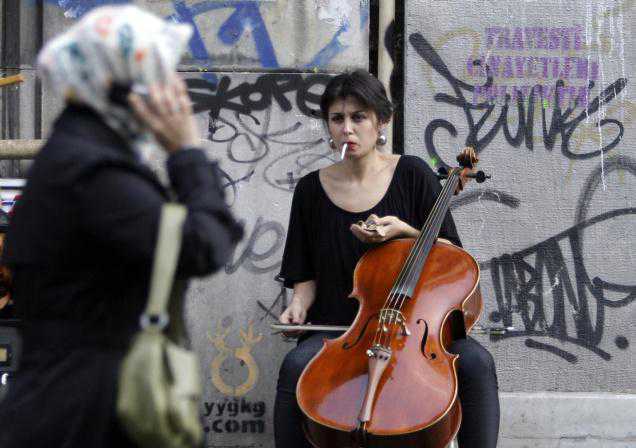A walk through an Istanbul airport bookstore might lead an unsuspecting traveller to think that English-language literary works from Turkey begin and end with the novels of Nobel-Prize-winning author Ohran Pamuk. In reality, a diverse range of Turkish writers now garners a growing amount of press time in English.
The tradition of writing in Turkey was strongest during the Ottoman Empire with Divan poetry, a flowery form recited at court, but new generations post-Empire have adopted the European form of the novel for their own logic. Poetry, though, remains the more satisfying and most developed written art.
1. Ersan Üldes broke out onto the writing scene in 1999 with the novel Yerli Film (Local Film), a story about an all-consuming cross-genre film that won the İnkilap Publishing House Novel Award. A translated excerpt from his third novel, Zafiyet Kuramı (The Theory of Infinity), was published in Dalkey Archive’s Best European Fiction 2011. Üldes’s humorous and tight prose recounts the experiences of a translator who “improves” on a series of German novels he is commissioned to translate; so much so that the books are more popular in translation than in German. The heavily self-reflective, but controlled writing should push the 38-year-old Üldes beyond other writers of his generation.
2. The heavily popular, but under-translated Kuçuk İskender writes in a variety of styles and genres, which include novels, short stories, poetry and reviews. Primarily, however, İskender is known as a poet, frequently appearing at readings and poetry festivals in Istanbul. Some of his work has appeared in the Eda, From Souljam and New European Poets anthologies and has been translated at workshops, but those translations remain unpublished. İskender lately has developed a jazz-influenced, colloquial style, which sounds best read aloud.
3. Mario Levi’s novels and memoirs remain uncovered gems from the past 30 years. His most recent work, İçimdeki İstanbul Fotografları (Photographs from the Inside of My Istanbul), is a biography of Istanbul in the late 1950s and early 1960s as much as it is Levi’s own autobiography. Often translated into French, Levi’s sole English-language story, “I Did Not Kill Monsieur Moise,” appeared last year in the collection, The Book of Istanbul. The story, heavily nostalgic, is a detailed character sketch of an agnostic Sephardic Jew through his belongings at the time of his death.
4. Cemal Süreya, dead since 1990, had his first poetry collection, Üvercinka (Pigeonwoman), translated in its entirety for the first time last year. Süreya was a member of the “İkinci Yeni” (“Second New”) movement in Turkish poetry, which pared down the trimmed language of that time into stark, juxtaposed lines similar to that of T.S. Eliot. His poetry and letters, centering around sex, death and life, are passionate, erotic and touching.
5. The trilingual Turkish Cypriot poet Mehmet Yaşın writes in Turkish, English and Greek, sometimes using all three languages in one poem. Yaşın has lived in Turkey, Cyprus and the United Kingdom. Turkey’s military government deported him in 1986 because the frank descriptions of Cyprus and his criticism of war contained in his first collections of poetry, Sevgilim Ölü Aşker (My Love, the Dead Soldier) and Işık-Merdiven (Light-Ladder), were deemed “subversive.” His overall oeuvre is lyrical, narrative and poignant, particularly when he writes about the conflicts of language as he does in the poem Wartime. Wartime and Don’t Go Back to Kyrenia are two of his translated poetry collections as well as Step-Mothertongue: From Nationalism to Multiculturalism: Literatures of Cyprus, Greece and Turkey, a book of literary criticism on national and cultural identity in Greek and Turkish literature from a multilingual approach.
Editor’s note:
Maria Eliades is an Istanbul-based writer who covers Turkish literature and culture.
via Turkey: Five Writers You Should Know Other Than Orhan Pamuk | EurasiaNet.org.


Leave a Reply